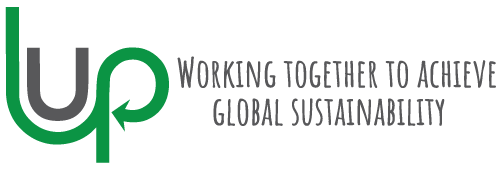Feature Guest Expert : Catherine Weetman (UK)
We were delighted to meet with renowned speaker, university lecturer, facilitator, author and expert in Circular Economies, Catherine Weetman based in the UK this month. In her book A Circular Economy Handbook for Business and Supply Chains, Weetman outlines how growing global consumption presents fantastic business opportunities, but these are blocked by our current linear systems (take some materials, make a product, use it and then throw it away) – we are depleting our ressources and overloading the living systems we depend on. The circular economy unlocks this problem by decoupling resources from consumption. Engaged businesses are re-thinking product design, material choices, business models and supply chains. Weetman’s book is a must-read for anyone who wants to apply the circular economy today. You can purchase a copy of the book here: A Circular Economy Handbook for Business and Supply Chains. Furthermore, LUP is very excited to be able to bring to you a six part series featuring Weetman in our upcoming newsletters/blogs with this inspiring expert on circular economies, highlighting a different topic each month. To begin the series this month, we would like to firstly introduce the concept of circular economies with Weetman’s 2017 talk at the Chartered Institute of Logistics and Transport (CILT) in the UK : Our special thanks to CILT in the UK as well for providing the video content.New Listings
Plastic Wheel Covers (Australia) In other news, last month we had a listing for some plastic wheel covers in Australia which were previously ending up in landfill. We are delighted to advise that our clients were able to find a solution for the 100 to 150 tonnes per annum of this plastic waste extremely quickly to re-purpose these, officially closing the loop and avoiding landfill. LUP was also able to source a few potential buyers that could take them, which highlights strong market demand for recycled plastics Bread Waste (Australia & Netherlands) Between March and April this year, we had previously listed bread waste available across Australia (in aggregate to over 10,000 tonnes per annum) which LUP had found potential buyers for. The challenge however, was the inability to find a viable logistical solution to transport the bread from various dispersed locations across the country within the limited life span before it would turn mouldy to the buyers. Through our discussions with our feature guest expert Weetman this month, Weetman highlighted an alternate solution for bread waste currently being utilised in the Netherlands, Europe for the issue of transporting bread waste to avoid landfill. The use of anaerobic bread waste bins, which composts the bread into fertiliser or to generate biogas. The bins also helped tackle the country’s rodent issue.report, with the average citizen throwing out 9.2kg worth per year.” More information can be found in the Guardian newspaper article from June 2017 by clicking here.




Active Listing: Labels backing paper
Labels Backing Paper The backing paper/release liner left over once labels are peeled off. The labels backing are commonly made of paper and silicone coated otherwise plastics such as Polypropylene (PP) or Polyester (PET) based liners. These liners are currently ending up as waste from warehouses & distribution centres as there is no current solution we are aware of to recycle this in Australia. LUP has access to approximately 20-40 tonnes of this per month which currently also ends up in landfill.Have a listing you want to register with LUP Global?
Then register it here. As we mentioned on our launch night, we may not be able to find a recipient or a supplier it straight away, but as our network grows, invariably the connections will come. Having your listings registered means we’re always on the look out to bring the right people in! You can get in touch with is via info@lupglobal.com. Be sure to follow us on Facebook, Twitter, and LinkedIn.News Corner
World Environment Day 2018: ‘Beat Plastic Pollution’ June 5 is marked by the United Nations as World Environment Day, a day set aside since 1974 to promote “worldwide awareness and action for the protection of our environment.” This year’s theme is “beat plastic pollution.”. A topic which particularly important, especially when you check these photos… Read more. Woolworths to stop selling plastic straws WOOLIES sells 134 million of these common items every year, but will completely ban them in response to customer pressure. Read more.
Road built with plastic bags and glass in Australian-first Soft plastics from approximately 200,000 plastic bags and packaging, and 63,000 glass bottle equivalents will be diverted from landfill to construct a Victorian road in an Australian-first trial. Read more.

